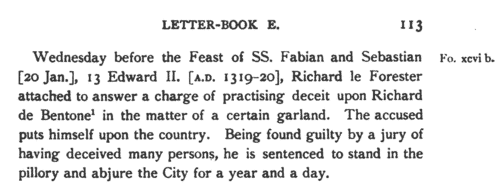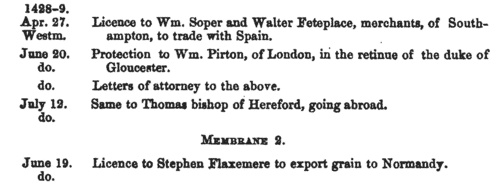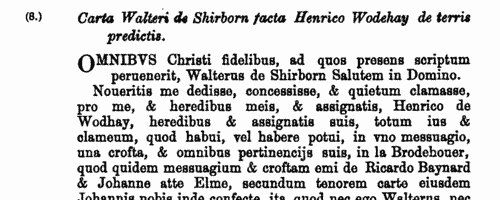Snowe Surname Ancestry ResultsOur indexes 1000-1999 include entries for the spelling 'snowe'. In the period you have requested, we have the following 75 records (displaying 1 to 10): Single Surname Subscription | | | Buying all 75 results of this search individually would cost £340.00. But you can have free access to all 75 records for a year, to view, to save and print, for £100. Save £240.00. More... |
These sample scans are from the original record. You will get scans of the full pages or articles where the surname you searched for has been found. Your web browser may prevent the sample windows from opening; in this case please change your browser settings to allow pop-up windows from this site. Deeds from Bath in Somerset
(1230-1239)
More than 500 mediaeval deeds survived in the muniment chest of Bath in Somerset, almost all dealing with the transfers of small plots of land in the city. Each names the grantor and grantee, describes the land, and is witnessed by other citizens. This printed edition was prepared by the Reverend C. W. Shickle, Master of St John's Hospital in Bath. Where (as in many cases) the earliest deeds were undated, he was able to assign periods to each on the basis of style and content, particularly the names of witnesses. SNOWE. Cost: £4.00.  | Sample scan, click to enlarge

| Liberate Rolls
(1240-1245)
These chancery liberate rolls of the 25th to 29th years of the reign of Henry III of England record the details of payments and allowances as part of the administration of government. Most entries start with the Latin words 'liberate', meaning 'deliver', or 'allocate', meaning allow. There are also 'contrabreves', warrants mainly to sheriffs of shires, assigning them tasks and allowing expenses. Most of the entries relate to England and Wales, but there are occasional references to Ireland and the English possessions in France.SNOWE. Cost: £4.00.  | Sample scan, click to enlarge

| Close Rolls
(1302-1307)
The close rolls of the 31st to 35th years of the reign of king Edward I, that is to the day of his death (7 July 1307), record the main artery of government administration in England, the orders sent out day by day to individual officers, especially sheriffs of shires: they are an exceptionally rich source for so early a period. In amongst this official material, the rolls were also used as a way of recording many acknowledgments of private debts and contracts between individuals. Most of the contents relate to England, but there are also entries concerning Wales, Scotland, Ireland and the English possessions in France.SNOWE. Cost: £4.00.  | Sample scan, click to enlarge

| Close Rolls
(1313-1318)
The close rolls of the 7th, 8th, 9th, 10th and 11th years of the reign of king Edward II record the main artery of government administration in England, the orders sent out day by day to individual officers, especially sheriffs of shires: they are an exceptionally rich source for so early a period. In amongst this official material, the rolls were also used as a way of recording many acknowledgments of private debts and contracts between individuals. Most of the contents relate to England, but there are also entries concerning Wales, Scotland, Ireland and the English possessions in France.SNOWE. Cost: £4.00.  | Sample scan, click to enlarge

| Freemen and citizens of London
(1314-1337)
Letter Book D, or the Liber Rubeus (Red Book) of the City of London contains enrolments of recognizances between inhabitants, particularly citizens, for sums of money lent or due; grants of pieces of land or property; and various records relating to the city administration, minor infractions, &c. In addition, this volume includes the record of admissions to the freedom of the city by redemption (payment of a sum of money), and the binding and discharge of apprenticeships for the same period. Without freedom of the city - which could only be gained by birth (patrimony), apprenticeship or servitude, or by redemption - no man could open a shop, sell goods retail, or even reside within the city walls (except for a limited time, and then only in the houses of freemen and under frankpledge). The text was edited by Reginald R. Sharpe and printed by order of the Corporation of the City of London in 1902.
SNOWE. Cost: £4.00.  | Sample scan, click to enlarge

| Inhabitants of London
(1314-1337)
Letter Book E of the City of London contains enrolments of recognizances between inhabitants, particularly citizens, for sums of money lent or due; grants of pieces of land or property; and various records relating to the city administration, minor infractions, &c.
SNOWE. Cost: £4.00.  | Sample scan, click to enlarge

| London, Essex and Hertfordshire clerks, clerics, monks and clergy
(1361-1374)
Ordinations to first tonsure, acolytes, subdeacons, deacons and priests, from the register of bishop Simon de Sudbury of London. London diocese covered Middlesex, Essex and part of Hertfordshire; the ordinations also attracted many persons from distant dioceses bearing letters dimissory from their ordinaries, and these are duly noted in the text. Many of these clerks would not go on to obtain benefices and remain celibate. The lists of subdeacons, deacons and priests state the clerks' respective titles, i. e., give the names of the person or religious house undertaking to support them. Monks and friars ('religious') are listed separately, and the lists of subdeacons, deacons and priests are also separated into beneficed and not beneficed (or 'not promoted'). The acolyte lists are unusual in giving a parish or diocese of origin.SNOWE. Cost: £6.00.  | Sample scan, click to enlarge

| Grantees of offices, commissions and pardons
(1413-1416)
The Patent Rolls are the Chancery enrolments of royal letters patent. Those for the 1st, 2nd and 3rd years of the reign of king Henry V (21 March 1413 to 20 March 1416) were edited for the Public Record Office by R. C. Fowler, and published in 1910. The main contents are royal commissions and grants; ratifications of ecclesiastical estates; writs of aid to royal servants and purveyors; and pardons. The commissions of the peace issued for the English towns and counties and entered on the rolls, being largely repetitive, have been consolidated in a single appendix.SNOWE. Cost: £2.00.  | Sample scan, click to enlarge

| The English in France
(1427)
King Henry VI of England (one of the grandsons of Charles VI of France) claimed the throne of France (and quartered the fleurs-de-lis of France with the lions of England on the royal standard) as had his predecessors since Edward III, as descendants of Philip IV of France. The English had real power or influence in Brittany, Normandy, Flanders and Gascony, and actual possession of several coastal garrisons, in particular Calais, where the French inhabitants had been replaced by English. Henry VI came to the throne only seven years after his father had trounced the French at Agincourt; but his cousin, Charles VII, who became king of France in the same year, spent his long reign rebutting the English king's claim to his throne by territorial reconquest and consolidation. The English administration kept a series of records called the French Rolls. On these are recorded royal appointments and commissions in France; letters of protection and safe-conduct to soldiers, merchants, diplomats and pilgrims travelling to France from England and returning, and to foreign legations. There are also licences to merchants to export to the Continent, and to captains to transport pilgrims. As Henry VI's reign progressed, and the English grip on northern France loosened, the French Rolls also increasingly include entries concerning the ransoming of English prisoners.SNOWE. Cost: £6.00.  | Sample scan, click to enlarge

| Clerks, clergy, benefactors and tenants of the Hospital of St Nicholas, Salisbury
(1214-1439)
Christopher Wordsworth, Master of the Hospital of St Nicholas in Salisbury, Wiltshire, published an edition of the 15th-century cartulary of that foundation in 1902. While transcribing the text, he interspersed it with notes and lists from his own researches so as to provide a general history of the hospital, and some of the material dates from much later than 1500, and relates to those institutions which he regarded as daughter institutions or offshoots of the hospital. There are later additions to the cartulary through to 1639, and records of the Chapel of St John Baptist on the Isle, the Scotist College of St Nicholas de Vaux (Valle Scholarium), and the collegiate church of St Edmund, Salisbury. There is also a calendar of records belonging to the hospital. The cartulary itself is a quarto codex of 80 leaves, copying charters of bequests to the hospital, and in these the main persons to appear are the benefactors, the witnesses, and occasionally the names of tenants, occupiers of adjoining tenements, and members of the hospital clergy. The cartulary is in six geographical sections: I, Box, Wyvelesford and Manningford Bohun; II, Broad Hinton; III, Fyssherton (Fisherton Aucher or Anger); IV, East and West Harnham; V, Salisbury; and VI, Gerardeston (Gurston in Broadchalke).SNOWE. Cost: £4.00.  | Sample scan, click to enlarge

|
Research your ancestry, family history, genealogy and one-name study by direct access to original records and archives indexed by surname.
|












